On February 28, 2019, a special message from Pope Francis was made public, which is dedicated to the celebration of the eight hundredth anniversary of the meeting of Christian saint Francis of Assisi with the Sultan of Egypt Al-Malik Al-Kamil. Simultaneously, from 1 to 2 March, this anniversary was celebrated in Egypt. We see that for both Muslims and Christians this event is of particular importance today, since it is one of the most vivid and early examples of how influential representatives of Islamic and Christian civilizations personally met with each other to resolve issues of peace.
As you know, the current Pope Francis took his name in honor of this particular Christian saint - Francis of Assisi, the founder of the famous Franciscan order and supporter of non-violent and constructive communication of Muslims and Christians. We do not know the true reasons why the Pontiff took this name for himself, perhaps by doing so he consciously wanted to show a desire to improve relations with the Muslim world. In any case, in this decision of the current Pope we see a certain symbolism, because today more than ever the topic of the Islamic-Christian dialogue is of particular importance.
The context and content of this meeting eight hundred years ago tell us that even in the most difficult periods of testing, a high level of culture and mutual respect can be maintained.
Two ambassadors of the world
Saint Francis of Assisi, born in 1182 in Northern Italy, was widely known in his time as a wandering monk, who was credited with the ability to talk with birds and wild animals. But first of all, he excelled in his preaching work, including as a man who called for the rejection of violence in favor of interfaith understanding.
Malik al-Kamil Nasir al-Din Muhammad (1180-1238) was the fourth Ayubid sultan of Egypt, Syria and Palestine (from 1218 to 1238). He was the son of al-Adil, the brother of Saladin, the first Ayyubid ruler of Egypt and the legendary Muslim politician and commander. Al-Kamil was educated so that he had the appropriate military and intellectual skills - he studied the Quran, Islamic law and other religious sciences. Interestingly, according to historian Paul Moses, author of the book “The Holy and Sultan”, the famous English king Richard the Lionheart (who for many years was the leader of the Crusaders and at the same time an opponent and friend of the Muslim leader Saladin) during one of the talks with Saladin and al-Kamil's father al-Adil, as a symbolic gesture of good relations, dedicated the eleven year old al-Kamil to knighthood.
Al-Kamil, who grew up in a society where Christians and Jews lived alongside Muslims, was known for his fair treatment of them. For example, he had such a reputation among the Coptic Christians of Egypt.
The peace-loving position of both Sultan al-Kamil and the monk Francis went into discord with the time in which they lived - the Holy Roman Empire led the Crusades against Muslims, Jews and other peoples whom it considered "heretics."
On the meeting of the monk Francis and Sultan al-Kamil
In 1219 there was another, fifth, Crusade against the Muslims. It was a brutal operation, in response to which the Sultan of Egypt Malik al-Kamil promised Byzantine gold for the head of each of the Christians participating in the Crusade. Against this background, the wandering monk Francis decided to set as his goal a call against violence. First of all, he went to the leader of the fifth Crusade commander and Cardinal Pelagius and offered to end the battle against the Muslims. However, Pelagius refused to Francis.
Then Francis, with his brother from the Illuminati Order, went to the Sultan of Egypt Malik al-Kamil.
Sultan friendly received Christian ascetics. Here is how the theologian and general of the Franciscan order Bonaventure (1218-1274) describes this meeting in his book on the life of Francis of Assisi:
“The Sultan asked who sent them to him and in what status they arrived. But Francis replied that they were sent by God, not by people, to preach the gospel message to him and his subjects. Sultan appreciated courage and enthusiasm and agreed to listen to Francis, and then offered him to stay for further conversations. ” Sultan liked that Francis shared his understanding of religion without offending Islam or disproving the Prophet Muhammad.
Taking into account the context of that time, it is clear that the only opportunity for Francis to go to negotiations with Sultan, without provoking anger from the Crusaders, was the preaching of Christian values. This could be considered a formal reason for meeting and talking about the peace. Of course, during the meeting, Sultan defended Islamic values. It could not be otherwise. And in the end, it is quite expected that in the discussions of the Sultan and Francis, everyone remained unconvinced.
However, firstly, the very fact of a peaceful and mutually interesting discussion is more important. Second, religious debates turned out to be a kind of form of diplomatic exchange of views that allowed each side to call for peace and find common value bases. From the point of view of medieval religious and political diplomacy, this was certainly a major breakthrough.
Here we can assume that Sultan al-Kamil, having before his eyes an example of the relations of his uncle Saladin and the English king Richard the Lionheart, who as opponents could find strength in themselves for mutual respect and even established friendly relations, he understood that Christians and Muslims can find common language and build a dialogue even in war.
The consequences of the meeting
When Francis decided to return to Italy, Sultan al-Kamil promised him guarantees of personal safety on Muslim lands and presented many gifts, but the Christian monk accepted only one of the gifts - an ivory horn, which used muezzin to call upon Muslims to pray. Upon returning home, Francis used this horn to call for prayer and preach among his fellow Christians.
Francis was struck by the fact that Muslims prayed five times a day, that is, they worshiped the Almighty. Subsequently, Francis began to encourage Christians to also make prayer a part of their daily life and shared with their fellow believers the respect for Muslims that arose during his visit to Egypt.
Sultan al-Kamil also changed his attitude towards his Christian opponents. Reportedly if someone from the Christians was captured by his troops, he treated them with unprecedented kindness and generosity.
Thus, Sultan al-Kamil (Muslim leader with the status of a European knight) and Christian saint Francis (with a horn for the Muslim call in his hands) became symbols of the Islamic-Christian dialogue of this time.
The fact of the significance of this meeting for its time is confirmed by its numerous images in the form of engravings and paintings that have reached our days. Here are examples of only some of them:
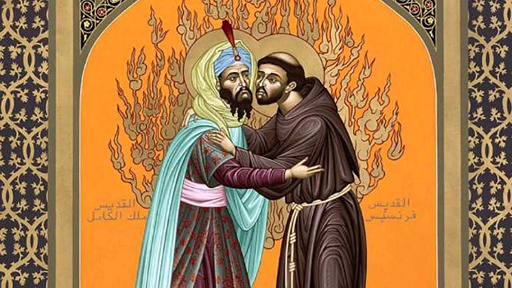
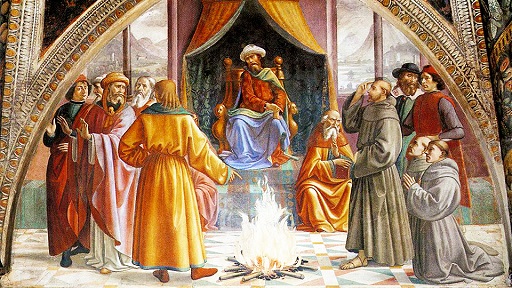

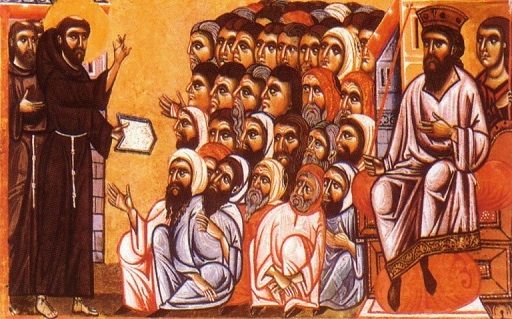
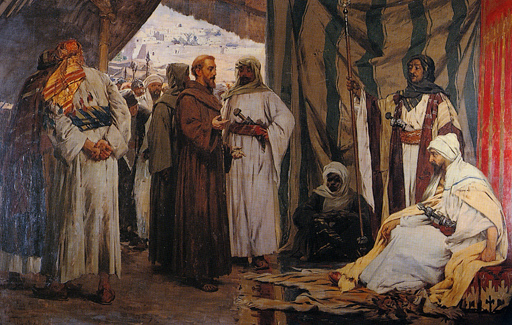
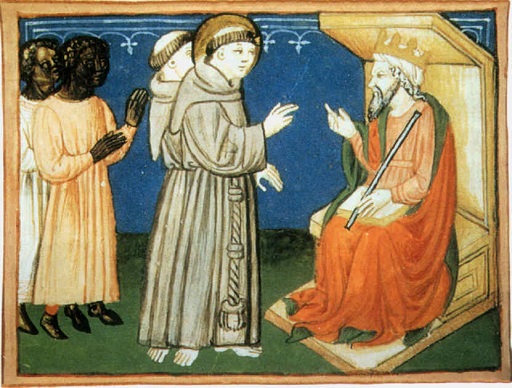
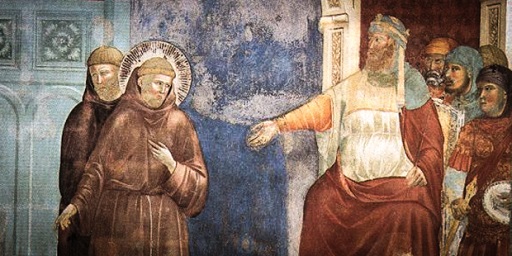
As we see the historical significance of the event of 1219 today is increasing. In this regard, the activities of the International Muslim Forum will be largely devoted to the theme of the dialogue of religions and cultures.
Photo: saltandlighttv.org, lastampa.it, disqus.com, aleteia.org, launchgood.com, sib-catholic.ru
